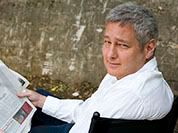Memo to Bush: You Burned Your Capital
By Christopher Truscott
 Make no mistake about it, George W. Bush understands American-style democracy. He made that abundantly clear in a press conference two days after winning a second term in office.
Make no mistake about it, George W. Bush understands American-style democracy. He made that abundantly clear in a press conference two days after winning a second term in office.“Let me put it to you this way,” the triumphant president told a White House correspondent, “I earned capital in the campaign, political capital, and now I intend to spend it.”
Whether the president actually earned capital is debatable. It’s more like he wrote a check during the 2004 campaign and by early 2005 it had been returned for insufficient funds. But the damage had been done – he was given a second term and political capital to spend until events warranted otherwise.
It didn’t take long for the illusion put forward during the campaign to fall apart. Iraq was a mess and getting worse, corruption was rampant and the president was clueless. Add to that the White House’s impotent response to Hurricane Katrina and it was clear that a president who once pledged to work to earn America’s trust was at best incompetent and at worst recklessly negligent.
With the Bush administration proving to be an embarrassing failure, voters from all walks of life came to the rescue last fall. Two years after giving him capital, Americans took it away, handing Democrats complete control of Capitol Hill for the first time since 1994. While the president maintained that he wanted to stay the course, it was obvious to everyone outside the White House that it’s time for a new direction.
After using the will of the voters as justification for his efforts to consolidate power after the 2004 election, the president is now presenting himself as the voice for bipartisan cooperation.
“For the good of our (n)ation,” the president said in his Saturday radio address, “I ask the Democratic leaders in Congress to seize the opportunity before us and move beyond political statements to bipartisan action.”
He’s urging Democrats to give him what he wants on Iraq and what he wants on the U.S. attorney firing investigation. Oversight? Don’t bother. In the president’s world, he’s the decider.
But it doesn’t work like that. In the words of Sen. Barbara Boxer, “elections have consequences.” Americans voted for oversight, they voted for ending the Iraq War and they voted for competence. No matter how the president tries to spin things, he can’t dodge the inescapable truth that his administration has been overwhelmingly rejected.
 Instead of continuing his Quixote-esque course of action, it’s time for the president to accept divided government and the will of the people. It’s time for him to acknowledge that Iraq is mired in a bloody civil war that only Iraqis can end. It’s time for him to live up to his pledge to maintain an honest administration. It’s time for him to accept reality, despite personal misgivings about its anti-Republican bias.
Instead of continuing his Quixote-esque course of action, it’s time for the president to accept divided government and the will of the people. It’s time for him to acknowledge that Iraq is mired in a bloody civil war that only Iraqis can end. It’s time for him to live up to his pledge to maintain an honest administration. It’s time for him to accept reality, despite personal misgivings about its anti-Republican bias.In 1877 another controversial president, Rutherford B. Hayes, stared down a divided nation and promised to work with his opponents.
“He serves his party best who serves the country best,” the 1876 popular-vote loser said during his inaugural address.
While Hayes’ presidency is largely forgotten, his place in history must look pretty good to Bush supporters right now. At this point even mediocrity would be better than the president’s current standing, which ranks somewhere near that of noted bungler Warren G. Harding, who once proclaimed:
“I am not fit for this office and never should have been here.”
Mr. Harding, after eight decades you now have company. Enjoy.
Christopher Truscott can be reached at chris.truscott@gmail.com. He rates the Bush administration somewhere in between the presidencies of Franklin Pierce and James Buchanan.
Labels: Corruption, Democrats, George W. Bush, Political Capital



0 Comments:
Post a Comment
<< Home